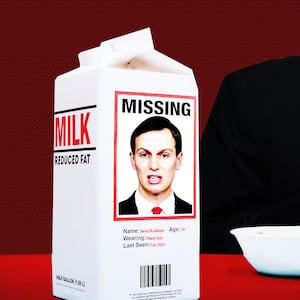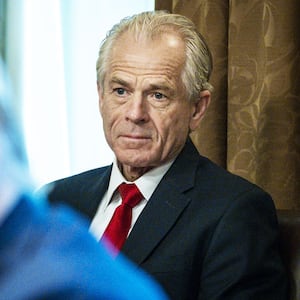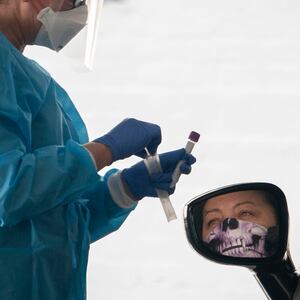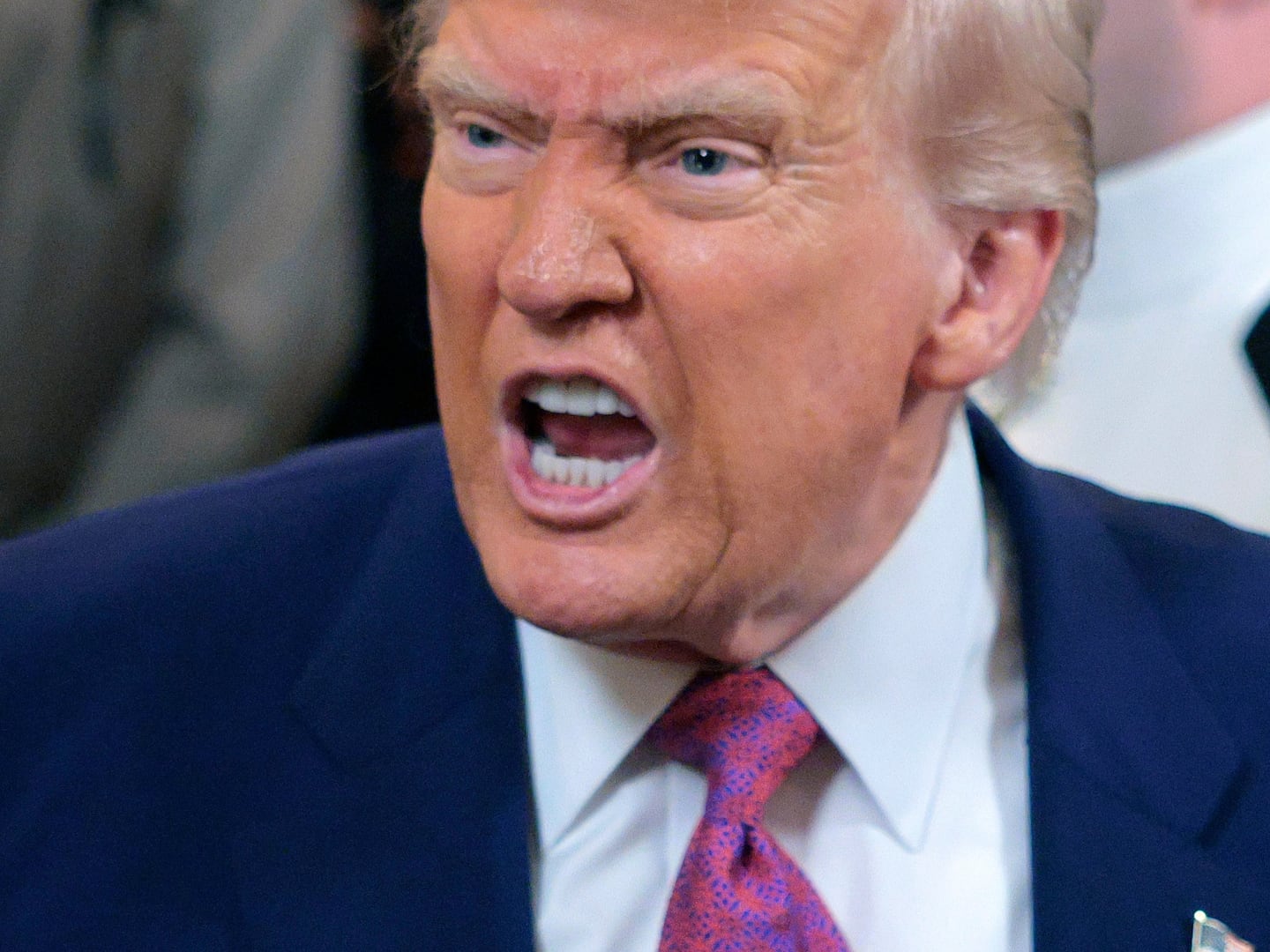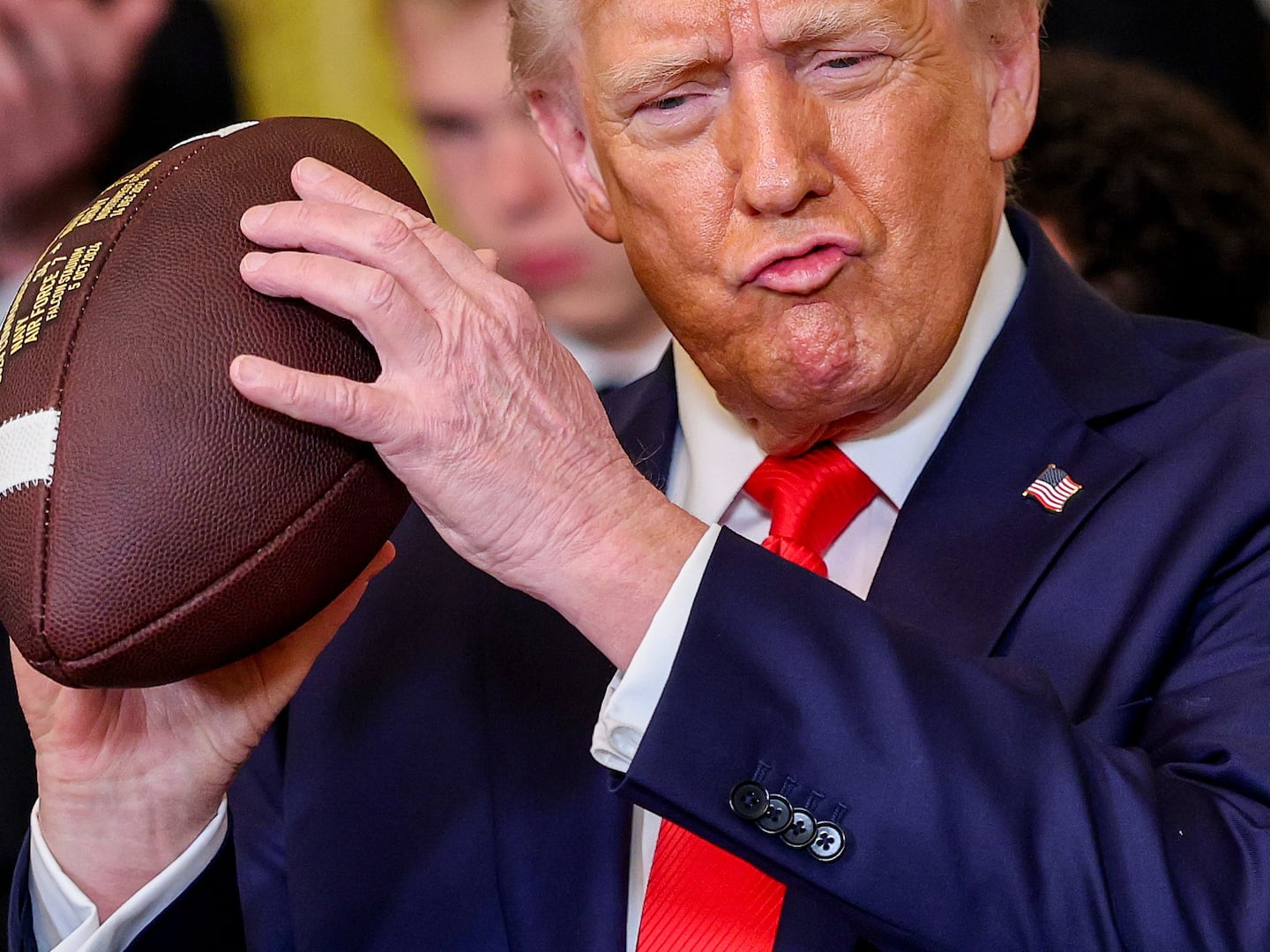Already under fire for his role atop a shadow task force aiding the administration’s response to the coronavirus, senior White House aide Jared Kushner is now being handed another critical job: helping get a vaccine for the disease developed in record time.
President Donald Trump, who has said he believes a COVID-19 vaccine will be available by the end of the year, is turning to his son-in-law to help streamline the effort, branded, “Operation Warp Speed.” Kushner is working alongside White House senior adviser Peter Navarro, who pitched the operation via memo to the president’s coronavirus task force as early as this February.
The hope inside the White House is that Kushner will be able to use his relationships in the private sector to speed up the normally lengthy development process, two sources familiar with Kushner’s involvement say.
“Jared has been vocal in meetings about wanting to engage the private sector on the development of a vaccine in a similarly successful way that the administration did on ventilators, PPE, and others,” a White House official said on Tuesday.
On Tuesday, The Washington Post published a story citing an official complaint lodged by a task force volunteer with the House Oversight Committee, alleging that Kushner’s operation has been hobbled by employing amateurish private-sector volunteers who were ill-suited for their vital assignments. The complaint alleged that the group responsible for acquiring PPE lacked backgrounds in health care or supply chain matters, had negligible success in their efforts, and were pressed to prioritize requests from VIPs in conservative media.
Over the last several weeks, members working with Trump’s coronavirus task force have pushed back against the idea that a reliable vaccine—even with Kushner’s help—would be ready for the American public before well into next year.
“We just do not see it happening [that soon],” said a senior Trump administration official who works closely with the coronavirus task force.
The administration publicly acknowledged Operation Warp Speed last week. But it has offered few details about how exactly it plans to speed the development process beyond reports that it will pool resources, bringing in private companies and the Pentagon, to more quickly test the vaccine on animals and then on humans in clinical trials.
“President Trump made it clear to the task force weeks ago that business as usual wasn’t good enough in the fight against the coronavirus, and vaccines are no exception” Michael Caputo, assistant secretary of public affairs at HHS, told The Daily Beast in a statement Tuesday night. “It’s not impossible and yet the scientists are right: it’s going to be very difficult… When it happens, it will be an historic victory for all of America, led by a president who just wouldn’t take no for an answer when it mattered most. Come to think of it, maybe that’s what President Trump’s critics really dislike about it.”
The lack of operational details, along with Kushner’s involvement, suggests that the Trump administration may once again find itself in a place where it is overpromising the public in its fight against the coronavirus.
Over the last two months, Kushner and his coronavirus task force team promised to ship 4 million COVID-19 tests by the middle of March and to have testing significantly scaled by that time. That didn’t happen. Kushner and his team also promised to scale testing by working with the private sector to increase the number of drive-through tests in the country. But that effort has been slow to develop.
It’s not clear who exactly Kushner is working with or relying on for Operation Warp Speed. But the enterprise has gotten off to a confusing start. Publicly, the president has spoken about a vaccine being ready this year as a goal increasingly within reach. And on Monday, Navarro told Fox News the White House could speed the vaccine development process if the medical community would merely just operate in “Trump time.”
But five administration officials who work closely with the task force, including one with the Federal Drug Administration, said that none of their analyses, predictions, or interactions with industry contacts suggest that the vaccine will be ready for the general public before that. Some of those officials who spoke to The Daily Beast said they have directly raised the timeline issue to Trump, only to have him say some variation of “I want it done, or I want it taken care of” anyway, another one of the officials recalled.
In the early days of the administration’s coronavirus response, officials had told The Daily Beast that Navarro had advocated for the U.S. to more aggressively pursue a vaccine for the coronavirus. Two officials who were in the room with Navarro for those conversations said they perceived his vaccine push as part of his messaging on “Buy America”—an executive order proposal that creates conditions whereby U.S. companies would have to look domestically for purchases of medicines and other medical materials.
“We were all surprised that [Navarro] was pushing this idea so early on before we knew what supplies we had and where we needed to look to help fill the gaps,” said an administration official. “It was clearly a way to push back against China and a lot of us were uncomfortable doing that in a big way without understanding what we still needed in the stockpiles and elsewhere.”
In reality, Navarro’s early interest in a vaccine was shared by others inside the administration. In February, he and Dr. Rick Bright, who until recently served as a program leader within the Biomedical Advanced Research and Development Authority (BARDA), wrote a memo outlining what the administration needed to do to prepare for a massive coronavirus outbreak in the country.
Bright, according to a whistleblower complaint he released on Tuesday, had pressed officials in the Department of Health and Human Services (HHS) and the Federal Emergency Management Agency (FEMA) for weeks to swiftly procure essential personal protective equipment and other medical supplies to prepare for an uptick in coronavirus cases and related deaths. But according to the complaint officials in the administration pushed back on his requests, saying there was no indication that the U.S. was running low on supplies it would need to contain the virus. Bright worked with Navarro to draft several memos requesting the task force direct HHS to not only procure protective equipment but to initiate and fund a program to develop a vaccine. They ambitiously set a goal of having a workable vaccine in seven months. But it took HHS nearly two months to operationalize the effort, Bright alleges in the complaint. The administration formally announced the operation last week.
Though Kushner is now involved in the effort, the president and his team are still in the midst of deciding who should be appointed Operation Warp Speed czar. A senior Trump administration official said other officials are expecting to finish interviews for a potential director by the end of the week, and are hoping to make an announcement shortly after the pick is made. Secretary of Defense Mark Esper and Health and Human Services Secretary Alex Azar are also co-leading the effort and their lieutenants are conducting the search process for a director. The current slate of shortlisted candidates include scientists and health officials both inside and outside the government.
Outside of Operation Warp Speed, a massive push has been taking place among private industry to streamline the development and testing of a potential COVID-19 vaccine. A handful of companies and research organizations—including Moderna, Oxford University and Pfiezer—have been working on vaccine candidates and begun clinical trials. These companies have said it’s possible that their immunizations could be proven effective as early as the fall of 2020.
Speaking on CNN, NIAID director Dr. Anthony Fauci described the prospect of a vaccine available in January 2021 as “feasible.” But those timelines are optimistic by historical standards. The mumps vaccine, which had perhaps the shortest development time, took four years. And experts note that most vaccines take years to produce, with high failure rates even for seemingly promising candidates.
“Ninety percent of them will probably fail to make it all the way to licensure either because they’re not inducing an adequate immune response or they’re sending up some safety flare that gives you pause and concern,” said Dr. Peter Hotez, a vaccinologist and the dean of Baylor College of Medicine's National School of Tropical Medicine, which is working on a COVID-19 vaccine. “Most of them will probably drop out and by the end of the day you might have two or three that might look promising.”
Moderna, whose vaccine research is backed by the National Institutes of Health, said it believes it is possible its candidate could be ready by the fall but only for a limited pool of high-risk recipients involved in critical services. In a note to investors, Pfizer said it’s possible that a vaccine candidate the company is working on with a German partner could be ready by year-end with “potential to supply millions of vaccine doses by the end of 2020” and “the potential to rapidly scale up the capacity to produce hundreds of millions of doses in 2021.”
Other pharmaceutical companies think it could take longer. French pharma company Sanofi has teamed up with GlaxoSmithKline to work on a vaccine and expects that their candidate, if successful, wouldn’t be ready until the second half of 2021.
In discussing the rush for an end-of-year vaccine, Trump spotlighted Johnson & Johnson and its announcement that it would begin building out its production capacity to make a billion vaccine doses even before its candidate goes into clinical trials. But the company has said that, even assuming its vaccine is proven effective, it wouldn’t be available until early 2021.
Trump’s push for a vaccine this calendar year mirrors his other overly-optimistic prognostications during the coronavirus pandemic. The president spent weeks promoting the use of an anti-malaria drug as a potential therapy for COVID-19, only to see scientific studies emerge raising concerns about medical side-effects and questions about its efficacy.
In recent weeks, Trump has advocated the speedy “opening” of the U.S. economy, even as public health experts, including in the administration, warn that the virus is still dangerously spreading into the warmer months. But those concerns seem to have been overwhelmed by others inside and out of the White House who fear that the American economy could be shattered beyond recognition—at least for the remainder of the president’s first term in office.
“One of the president’s greatest fears was running on an economy in recession or that wasn’t the amazing, booming economic engine that he had held up as the ‘Trump economy,’” said a former senior White House official. “And we’re far beyond that now.”
Stephen Moore, a Heritage Foundation economist who informally advises Trump and other administration officials, said in an interview on Monday that he and fellow conservative economist Art Laffer had already sent their policy memo on opening states to the White House last week. The memo was based on a recent Laffer Associates study that Moore says was conducted over the course of “a couple weeks,” and is now in the hands of senior White House staff.
“Our model shows that if we start the opening of the country [right about now], by the end of the summer we could start to see a recovery,” Moore said. “But if we wait until, say, the middle of June, we might have to write off all of 2020. At that point, so much wealth would have evaporated.”

